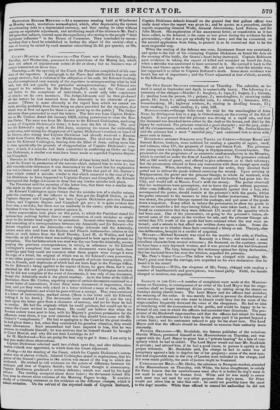THE OLD BAILEY SESSIONS commenced on Thursday. The calendar, as
in- deed is usual in September and April, is numerically heavy. The following is a summary of the charges—Murder, 2; burglary, 4; rape,2 ; forgery, 5; bigamy, 2; stealing from the person, 55 ; perjury, '2; manslaughter, 4; receiving stolen goods, 16; fraud, 4; selling counterfeit coin, 1; uttering, 1; larcenies, 195 ; house-breaking, 10; highway robbery, 8; stealing in dwelling houses, 15; horse stealing, 3; cattle stealing, 2; total, 339. MANSLAUGHTER.—George Sebo took his trial for the manslaughter of John None, by drivingover him in a gig, in Oxford-street, on the evening of the 6th of August. It was proved that the prisoner was driving at a rapid rate, and that the deceased was knocked down either by the shaft or the horses, and died by the injury he sustained. The prisoner received a good character ; and the jury, under all the circumstances, returned a verdict of " Not Guilty." Mr. Justice Gazelee said the prisoner had a most "merciful jury," and cautioned him to drive with inure care in future. DIFFERENCE BETWEEN STEALING AND TAKING ON Ceerer.—George Keene ▪ a▪ nd Samuel Keene, brothers, were indicted for stealing a quantity of segars, snuff; and tobacco, value 171., the property of James and Simon Foot. The prisoners are young men who kept a tobacco-shop in Brydges-street, Covent Garden. The prosecutors are the proprietors of an extensive snuff-manufactory in the Minorics, whitli is carried on under the firm of Lundyfoot and Co. The prisoners ordered 501. or 60/. worth of goods, and offered to give references as to their solvency; but the prosecutors refused to have any transaction with them except upon ready money terms. When, therefore, they executed the order, they directed their porter not to deliver the goods without receiving the money. Upon arriving at Brydges-street, the porter saw the prisoner George, to whom he tendered, with the goods, a receipt for their amount. George said his brother had gone into the City, and would call at Messrs. Foot's with the money. The porter observed that his instructions were peremptory, not to leave the goods without payment. After some difficulty on this subject, it was ultimately agreed that a boy, who accompanied the porter, should remain at the prisoner's with the goods, whilst the porter returned to his masters to take their further instructions. Whilst he was absent, the prisoner George opened the package, and put some of the goods down a trap-door. Every effort to induce the prosecutors to allow the goods to remain on credit for a few days having failed, they were taken back; but it was found on examination that they were deficient 17/. worth of the quantity which had been sent. One of the prosecutors, on going 'to the prisoner's house, ob- served sonic of the segars in the window for sale, and the prisoner George ad- mitted that 17/. worth of the goods had been retained when the rest were re- turned; and a minute to that effect was written down upon a slate. Some dis- cussion arose as to whether these facts constituted a felony or not. The jury, after due deliberation, brought in a verdict of acquittal.
_.-- -
1 Muenee.—Michael Kennedy was tried for the murder of his wife, at Pimlico, 1 by throwing her over the window. Kennedy is a Dane ; and received a most lexcellent character from several witnesses ; the deceased, on the contrary, seems to have been a very depraved woman, and it was proved that she had threatened i suicide before. The Jury, balancing this testimony against her dying declaration, that her husband threw her over the window, acquitted the prisoner. '.-"-MR. PEEL'S GREAT Coa-r.—The fellow who was charged with stealing Mr. Peel's great coat from the carriage, was acquitted on his own declaration that he found it in the street!
Snor Roneeer.—Wilks, the shopman of Mr. Verey, chirged with stealing a number of handkerchiefs and gown-pieces, was found guilty. Field, the female charged as receiver, was acquitted.


















 Previous page
Previous page